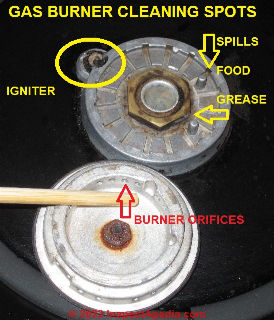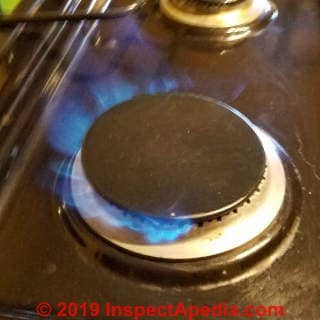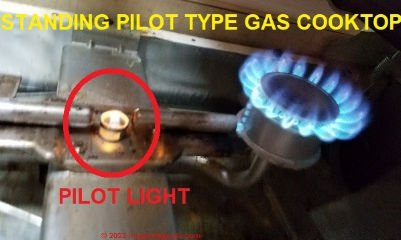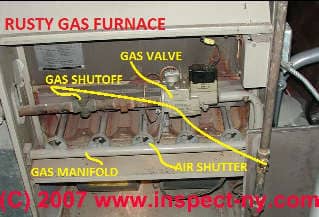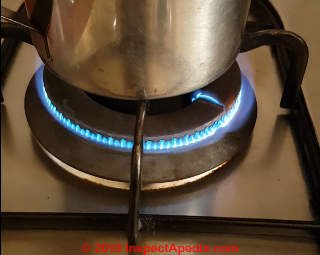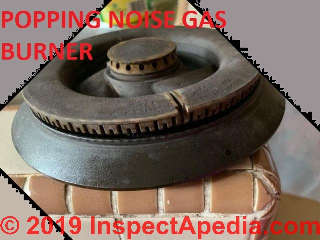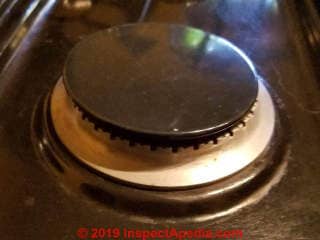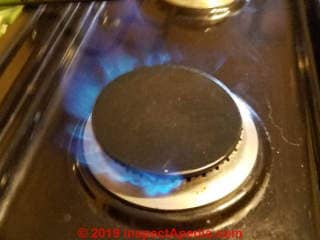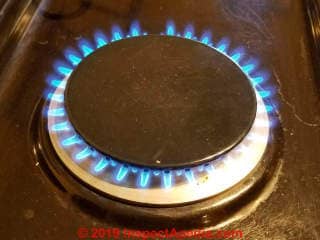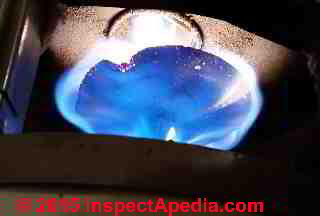 Gas Burner Popping Noises
Gas Burner Popping Noises
Gas Appliance / Heater / Burner Popping Diagnosis, Cause, Cure
- POST a QUESTION or COMMENT about gas burner operating problems: flame defects, noises, safety hazards
Gas burner or gas appliance popping noises:
Here we describe the most-common causes of popping noises or sounds at gas burners found on stoves, range tops, ovens, gas fired heaters, boilers, or water heaters, and we suggest how to fix the popping sound.
We point out that some of these gas burner popping sounds are signs of a dangerous condition.
This article series provides descriptions of the cause & cure of unsafe gas burners, appliances, regulators, heaters, gas piping, & other indications of unsafe or improperly operating gas appliances, gas meters, and other gas installation defects are provided.
InspectAPedia tolerates no conflicts of interest. We have no relationship with advertisers, products, or services discussed at this website.
- Daniel Friedman, Publisher/Editor/Author - See WHO ARE WE?
Cause & Cure for Popping Noise at Gas Burners
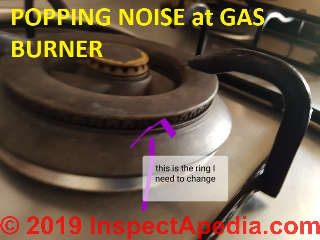 Watch out: most of these LP gas , propane, or natural gas burner conditions are potentially very dangerous and needs prompt attention.
You should turn off the fuel supply to any gas appliance expected of leaking - to reduce the risk of a catastrophic gas explosion.
Watch out: most of these LP gas , propane, or natural gas burner conditions are potentially very dangerous and needs prompt attention.
You should turn off the fuel supply to any gas appliance expected of leaking - to reduce the risk of a catastrophic gas explosion.
Then have your utility company or service person check the appliance immediately.
[Click to enlarge any image]
Top 16 Causes of Popping Sound at Gas Burners on Appliances or Heaters
These causes of popping gas burners are given roughly in the order of probability
- Burner cap is askew -
check this first, but don't get burned: don't touch a hot burner cap. Let the burner cap cool off first.
details are at GAS BURNER CAP NOT SEATED - Wet gas range top burners or burner cap
did you recently clean the stovetop? Did a liquid boil over on the burner?
Lift off, inspect, and dry the burner caps and other lift-off burner parts.
Rarely, there may be water in the gas piping from condensation or from a bad gas delivery;
If your burner assembly contains parts that can be simply lifted off for inspection and cleaning (the grate, the burner cap, and on many stovetops, the burner base) lift off, clean, and dry each part in succession.
Be thorough in your inspection for spills into the cooktop. Spills of water or any cooking liquid that leak down into the cooktop assembly may wet the igniter wires or other components leading to igniter malfunction, clicking, sparking, or failure to spark.
See also IGNITER CLICKING DIAGNOSIS
- Dirty or blocked gas burner orifices
in part or all of the burner or burner ring.
Use a soft brush like a toothbrush or a toothpick to clean out any dried grease or food that is clogging the orifices or gaps that regulate the flame at the burner.
Watch out: never use a metal tool that can break, gouge, or enlarge the burner gaps or orifices.
- Damaged igniter
or igniter wire or food or other debris fouling the igniter causing it to shut off early.
- Dirty pilot flame orifice or tube
older gas appliances including the cooktop shown below may use a standing pilot light rather than an igniter to light the gas burners on your stove.
On occasion you may trace a popping noise (or other gas burner lighting troubles to a clogged or dirty orifice not at the gas burner itself but at the pilot.
Below: a properly-functioning standing pilot on a gas stove in a cabin at Bearskin Lodge, in northern Minnesota.
- Improper air mix
supplying combustion air to the burner
Check the air mix for the individual burner that's popping. Try first opening the air shutter just a tiny bit more (perhaps 1/16" to 1/8" wider opening) to give a bit more combustion air and note if this makes the popping better or worse.
Flame should be blue. If the air supply is too little (mixture is too rich) the flame will be weak or blow out.
If the air supply is too much the flame will be yellow.
See details at FLAME COLOR, BLUE vs YELLOW COMBUSTION
The air shutter on a gas range or most gas cooktops and on grilles is located at the end of the air tube closest to the control knob for the burner. Usually there is a set screw that must be loosened to permit turning the air shutter more-open or more-closed. Remember to re-tighten the screw after each adjustment.
The air shutter on a gas burner in a heating furnace or boiler is located at the end of the burner tube closest to the supply manifold - Thermal expansion of metal parts
occurs in gas ovens as the oven heats up, may be normal.
Thermal expansion-caused gas appliance popping - if due to thermal expansion - will usually occur as a single popping noise occurring once during heat-up or during cool-down when the stovetop or heater is turned off. . - Flashback extinction pop
occurs at the time a burner is turned off or 2-3 seconds later, typically caused by a combination of hot burner components and left-over gas fuel in the supply to the burner.
This is normal on some appliances such as by Maytag & Subzero-Wolf and is usually but not always safe.
Check the adjustment of air supply to the burner.
Watch out: for loss of pilot flame at gas burners that lose a pilot. Extinction popping or flashover popping can blow out a nearby pilot. - Delayed gas ignition
at a gas burner - if popping or a small gas explosion occurs once after the burner has been turned on.
Watch out: this condition can be unsafe
Check for improper gas type (LP vs Natural gas)
Check for a bad gas igniter or igniter wire or igniter control element - Cracked gas burner cap or burner ring
inspect closely for damage and replace if damage is found - Leak in gas connections
at burner - watch for flame roll-out - Contaminants in the gas supply
if at all burners all the time - Abnormally-low gas flame
if at all burners every time - check the gas regulator and the regulator vent - Blocked gas injector nipple
in the appliance - unscrew, clean, replace, taking care not to cross-thread and damage the (usually brass) fitting - Damaged gasket or packing
check for damaged, lost, askew packing used at some gas burners - Water heater popping noise
at gas-fired water heater may be due to scale on the bottom of the water heater tank.
See details at WATER HEATER SCALE DE-LIMING PROCEDURE
Other common noises at gas burners
- Clicking
at the burner / igniter
- see GAS IGNITER DIAGNOSIS & REPAIR
- and GAS COOKTOP or STOVE IGNITER REPAIR - Rumbling roaring gas flame with flame lifting off the burner - gas supply pressure is too high; check gas regulators in the system
- see GAS REGULATORS & APPLIANCE / HEATER CONTROLS
- and LPG & PROPANE APPLIANCE PRESSURES
- and NATURAL GAS APPLIANCE PRESSURES
Question: My gas stove is currently making popping sounds
Dear helpful personnels at inspectapedia.
My stove is currently making popping sounds.
I suspect that its because the burner cap is not flat.
That in turn causes air to flow resulting in the popping sound. I have no experience whatsoever hence would like to ask for your opinion before I actually purchase a replacement burner cap.
Kindly advice.
Im attaching a video and some diagrams to ensure you are able to understand what I mean. Kindly assist me.
Reply:
If there are other burners on your stove that are the same size as the popping one, just swap over the burner and burner cap from one of those.
If the popping noise continues then the problem isn't the burner cap.
Check also that the burner ring and cap parts are properly-seated on the stove. It's easy to set one askew leading to improper burner operation.
Reader Follow-up:
... thanks a lot for taking the time to reply to my query. Unfortunately I do not have any burner caps that matches the size of the faulty one. Guess that would mean I need to get someone onsite.
Grateful for your response though.
Reply:
I suggest a more-careful look at the seating and also for blockage of any gas openings and perhaps for a gas leak as well as checking the causes listed
at GAS BURNER POPPING NOISES before ordering the new part.
On 2017-01-10 by Pat merrick
Had a popping sound coming from a bran new log set in a new home on propane.
We eliminated everything in the line from 500 gallon propane tank to LP log set and finally hooked directly to tank and still have the same popping.
What's in the propane that's causing it ? Air ?
Burned the log set at 3 different location besides this home and it burned perfect. What's up
On 2017-01-10 by (mod) popping sound coming from a new log set on propane
I don't know, Pat and I worry that it's unsafe. Perhaps something has become disturbed, broken, damaged, clogged (I've found spiders inside burners) as you've moved this gas log set four times, now.
Check the air shutter adjustment for the burner too.
Gas Burner Flame Uneven, Yellow, Askew, Noisy
When a gas burner cap is askew the burner may fail to ignite at all - the cap is perhaps shorting the igniter, or the flame will be lopsided - and dangerous, as shown in my photos below.
Above: on a Mabe gas range installed in San Miguel de Allende, Guanajuato, we show a burner cap slightly askew, off its base. Below you can see what that does to the gas flame.
Below I show the proper gas flame after the burner cap was re-seated. Fixing this takes just seconds but
Watch out: about touching a hot burner cap. You can get a nasty burn.
If the range or cooktop gas burner flame is not even or is yellow in some areas check for
- Clogged burner ports
- Air shutter at the burner control is improperly-set
- Wrong gas fuel type (you're using natural gas on an appliance set up for propane, or you're using propane on an appliance set up for natural gas) - Watch out: this is unsafe and risks fire or explosion
If the gas flame is very noisy and too strong and lifts off of the burner check for
- Burner cap askew - as in our photo shown earlier
- Gas regulator improperly set - wrong gas pressure
- Wrong gas fuel type (you're using natural gas on an appliance set up for propane, or you're using propane on an appliance set up for natural gas) - Watch out: this is unsafe and risks fire or explosion
...
Continue reading at GAS BURNER FLAME & NOISE DEFECTS or select a topic from the closely-related articles below, or see the complete ARTICLE INDEX.
Or see these
Recommended Articles
- BANGING HEATING SYSTEM NOISES
- BLUE vs YELLOW COMBUSTION FLAMES
- GAS BURNER FLAME & NOISE DEFECTS
- GAS BURNER PILOT LIGHT PROCEDURE
- GAS BURNER POPPING NOISES
- GAS BURNER RUMBLING CHUGGING NOISES
- GAS BURNER SOOT CAUSE & CURE
- GAS COOKTOP or STOVE IGNITER REPAIR
- GAS FIRED WATER HEATERS
- GAS IGNITER DIAGNOSIS & REPAIR
- GAS LEAK DETECTION, LP / NG
- GAS REGULATOR NOISES - buzzing, humming, and other noises at gas appliance regulators
- POPPING SNAPPING NOISE DIAGNOSIS
- WATER HEATER SCALE DE-LIMING PROCEDURE
Suggested citation for this web page
GAS BURNER POPPING NOISES at InspectApedia.com - online encyclopedia of building & environmental inspection, testing, diagnosis, repair, & problem prevention advice.
Or see this
INDEX to RELATED ARTICLES: ARTICLE INDEX to GAS APPLIANCES, PIPING, CONTROLS
Or use the SEARCH BOX found below to Ask a Question or Search InspectApedia
Ask a Question or Search InspectApedia
Questions & answers or comments about gas burner operating problems: flame defects, noises, safety hazards.
Try the search box just below, or if you prefer, post a question or comment in the Comments box below and we will respond promptly.
Search the InspectApedia website
Note: appearance of your Comment below may be delayed: if your comment contains an image, photograph, web link, or text that looks to the software as if it might be a web link, your posting will appear after it has been approved by a moderator. Apologies for the delay.
Only one image can be added per comment but you can post as many comments, and therefore images, as you like.
You will not receive a notification when a response to your question has been posted.
Please bookmark this page to make it easy for you to check back for our response.
IF above you see "Comment Form is loading comments..." then COMMENT BOX - countable.ca / bawkbox.com IS NOT WORKING.
In any case you are welcome to send an email directly to us at InspectApedia.com at editor@inspectApedia.com
We'll reply to you directly. Please help us help you by noting, in your email, the URL of the InspectApedia page where you wanted to comment.
Citations & References
In addition to any citations in the article above, a full list is available on request.
- Bosch, "Gas Cooktops Installation Manual, NGM Gas Cooktops (NGM30, NGM50, NGM 56, NGM80, NGM86, NGMP65)", (2013), Bosch, 1901 Main St., Suite 600, Irvine CA 92614, Tel: 800-944-2904, Website: www.bosch-home.com
- Bosch, "LP Gas Conversion Kit Installation Manual , NGM Gas Cooktops (NGM30, NGM50, NGM 56, NGM80, NGM86, NGMP65)", (2014), Bosch, 1901 Main St., Suite 600, Irvine CA 92614, Tel: 800-944-2904, Website: www.bosch-home.com
- Bosch, "Gas Cooktops Use and Care Manual, NGM5055, NGM8055, NGM8065, NGMPO55, NGM5655, NGM8655, NGM8665, NGMP655", (11/13), Bosch, 1901 Main St., Suite 600, Irvine CA 92614, Tel: 800-944-2904, Website: www.bosch-home.com
- U.S. Energy Information Administration - eia.doe.gov/
- U.S. Environmental Protection Agency - epa.gov/solar/energy-and-you/affect/natural-gas.html
- At Natural Gas.Org www.naturalgas.org/environment/naturalgas.asp#emission you’ll find a table of combustion products
- At geocities.com/rainforest/6847/report1.html is an interesting and detailed though not “neutral” report on the components and contaminants in the combustion of natural gas. You’ll see a long long list of emissions products, but look again – most of the contaminant levels listed are in the picograms.
- apvgn.pt/documentacao/iangv_rep_part1.pdf lists the components in natural gas exhaust from vehicles
- The Need Project, Manassas, VA: need.org/needpdf/infobook_activities/SecInfo/NGasS.pdf
- Kroschwitz, Jacqueline I., and Mary Howe-Grant (eds.). "Gas, Natural." In Encyclopedia of Chemical Technology. 4th ed., vol. 12. New York: John Wiley and Sons, Inc., 1993.
- Tussing, Arlon R., & Bob Tippee. The Natural Gas Industry: Evolution, Structure, and Economics. 2nd ed. Tulsa, OK: PennWell Publishing, 1995.
- Carbon Monoxide Gas Toxicity, exposure limits, poisoning symptoms, and inspecting buildings for CO hazards
- HOT WATER HEATERS - a detailed guide to all types of hot water sources, problems, inspection, repair
- SEWER GAS ODORS in COLD / WET WEATHER - Septic Odors or Sewage Odor Diagnosis & Repair Guide for diagnosing and eliminating cold weather sewer gas odors
- Water Pressure Loss - Diagnosis how to determine why water pressure has been lost or why there is no water at all in a building
- In addition to citations & references found in this article, see the research citations given at the end of the related articles found at our suggested
CONTINUE READING or RECOMMENDED ARTICLES.
- Carson, Dunlop & Associates Ltd., 120 Carlton Street Suite 407, Toronto ON M5A 4K2. Tel: (416) 964-9415 1-800-268-7070 Email: info@carsondunlop.com. Alan Carson is a past president of ASHI, the American Society of Home Inspectors.
Thanks to Alan Carson and Bob Dunlop, for permission for InspectAPedia to use text excerpts from The HOME REFERENCE BOOK - the Encyclopedia of Homes and to use illustrations from The ILLUSTRATED HOME .
Carson Dunlop Associates provides extensive home inspection education and report writing material. In gratitude we provide links to tsome Carson Dunlop Associates products and services.


